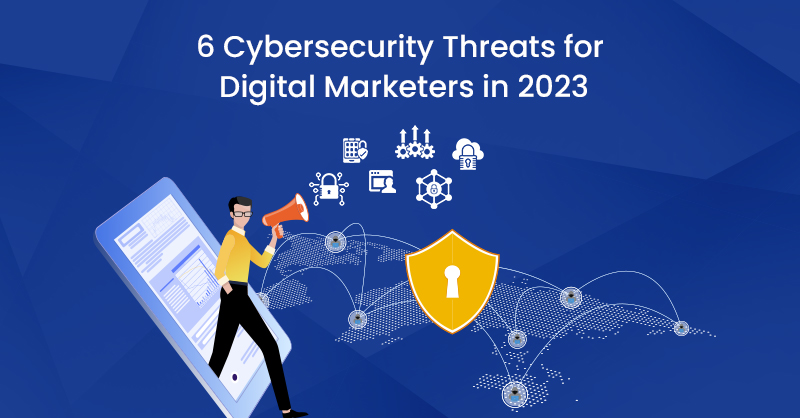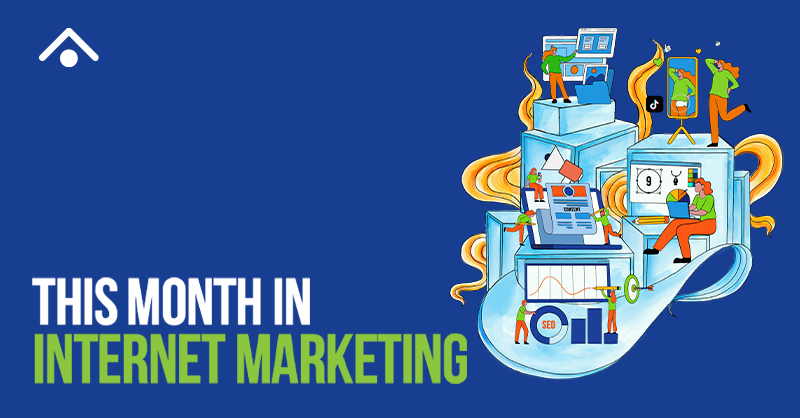Cybersecurity has never been more important in the age of big data and digital marketing. Every day, marketers collect and store more sensitive data, from customer contact information to sales histories.
As we’ve seen all too often in the news, that data can be a valuable target for cybercriminals.
The new year is coming soon, and it means that many new technologies will be developed, and the old ones will be getting smarter. No one knows what 2023 will bring, so it’s more important than ever to think about what cybersecurity measures you can implement to protect yourself and your business from all possible digital threats.
Why Should Digital Marketers Care About Cybersecurity?
As a digital marketer, you might think: “Cybersecurity is the IT team’s job, not mine.”
But the truth is, cybersecurity should be a top priority for everyone in the organization – especially marketing.
Here are three reasons why:
1. Your Data Is A Valuable Asset
Every day, you collect more sensitive data about your customers and prospects. That data is a valuable asset for your business and can also be a valuable target for cybercriminals.
If that data falls into the wrong hands, it could be used to commit fraud or identity theft. It could also be sold on the black market. And if it’s leaked, it could damage your company’s reputation – and cost you many customers.
2. You’re A Target
Cybercriminals are always looking for new targets. Businesses of all sizes are at risk, especially smaller ones.
In fact, according to Verizon, 61% of all cyberattacks targeted small to medium-sized businesses last year.
This is because smaller firms are more likely to use tech at work without investing in adequate cybersecurity measures.

You might think you’re not a target as a digital marketer because you’re not handling financial data.
But cybercriminals will target any type of data they can find – including contact lists, customer data, and marketing plans.
And if they can gain access to your company’s systems, they could use your business as a launching pad to attack other businesses as well.
3. You Could Be Held Responsible
Businesses are often legally responsible for the data they collect and store. So, if there’s a data breach, you could be held liable – even if you didn’t do anything wrong.
Plus, as cybersecurity threats are becoming more publicized, consumers are also growing more aware of the risks. And they’re starting to hold businesses accountable for protecting their data.
According to survey the Ping Identity 2019 Consumer Survey:
- 81% of consumers say they would stop doing business with a company that had a data breach
- 63% of consumers believe that a company is entirely responsible for protecting their data
- 55% of respondents feel that a company sharing data without their permission is much more likely to be hacked or experience a data breach
So, not only do you need to worry about the most common cybersecurity threats themselves. But you also need to worry about the potential damage to your reputation, legal proceedings, as well as your bottom line.
Key Cybersecurity Threats For Digital Markets In 2023
Now we’ve discussed why cybersecurity should be a priority for digital marketers, let’s look at the six most common cybersecurity threats you need to be aware of in 2023:
1. Data Breaches
A data breach is when an unauthorized person gains access to a company's sensitive data. This data includes client contact information, financial data, and marketing plans.
According to a report by IBM, the average data breach cost is $4.35 million. The average time to resolve a data breach is 277 days.
What’s more, data breaches can have a lasting impact on businesses. In fact, 60% of small businesses that experience a data breach often go out of business within six months.
Data breaches can happen in many ways. Generally, they often occur when hackers exploit weaknesses in a firm’s systems or workers unknowingly/deliberately expose data.
Some of the most common ways data breaches occur in the marketing world include:
- Accidental loss or disclosure: This occurs when a worker accidentally discloses data to outsiders
- Hacking: This occurs when hackers gain unauthorized access to a company’s private systems or networks
- Malware: This is a type of malicious software that can infect systems and allow hackers to steal data and passwords or disrupt operations. Malware is often installed on a system through phishing attacks or vulnerabilities in software.
- Insider threat: This is when an employee deliberately discloses or sells sensitive data to competitors. In today's world, insider threat management is important.
- Physical theft: This occurs when data is physically stolen, such as from a laptop, smartphone, or USB drive.
2. Phishing And Email Marketing
Phishing is a type of cyberattack in which hackers attempt to trick victims into sharing sensitive information. Such as login credentials or financial data.
These attacks are often carried out by email and can be surprisingly effective. In fact, a recent survey suggests that more than 70% of people end up opening phishing emails. It also found that 90% of business data breaches occur due to phishing attacks.

Additionally, phishing attacks are becoming more sophisticated and difficult to spot. Nowadays, cybercriminals can easily hack into and use company accounts to deliver emails or spam to their clients and workers.
This is why as a modern-day digital marketer, educating yourself and your team on how to spot phishing attacks and other similar types of digital threats is more important than ever.
3. Fraud On Social Media
Social media fraud is a type of cybercrime in which hackers use fake accounts or profiles to trick people into giving them information or money.
This type of fraud can be difficult to spot, as criminals often use stolen photos and personal information to create fake profiles.
And according to a recent report by the Federal Trade Commission (FTC), it’s on the rise. The study found that more than 95,000 people in 2021 fell victim to social media fraud. A whopping eighteen-fold increase since 2017!
Therefore, if you use social media to promote your products or services, you need to be aware of this type of fraud and take steps to protect yourself and your customers.
If you're ever unsure whether an account you're interacting with is genuine, try searching for the person or firm on other social platforms or perform a reverse image search.
Bonus Tip: If your team has many members using the same business media account, ensure all are using a password manager to keep the account credentials safe to protect your business from identity theft.
4. CMS Attack
A CMS attack is a cyberattack in which criminals exploit vulnerabilities in a company’s Content Management System (CMS) to access sensitive data or information.
CMS attacks are becoming more common as businesses increasingly rely on CMS platforms, such as WordPress and Drupal, to build and manage their websites.
Unfortunately, these brute-force attacks can be quite challenging to detect and prevent. This is because they often exploit vulnerabilities that are not yet known or patched.
Outdated CMS plugins, themes, and extensions can also be a huge security risk, so be sure to update them regularly or delete them if they are no longer in use.
5. CRM Malware Attacks
A CRM malware attack is a type of attack in which hackers gain access to a company’s customer relationship management system.
These attacks can be highly damaging. This is because it often leads to significant business downtime and the loss or theft of customer data, such as:
- Names
- Addresses
- Credit card information
Hackers can also hold this data hostage and demand you pay a ransom in return.
6. Domain Attacks
One of the biggest cybersecurity threats for digital marketers and businesses is domain attacks (DA).
DAs are an attack in which hackers exploit weaknesses in a company’s Domain Name System (DNS) to redirect traffic away from the actual site to a fake one.
Most of the time, this type of attack is hard to identify, as it often occurs without any noticeable change in the website’s appearance.
Some of the most popular domain attacks include:
- Cross-site scripting: In this type of attack, the attacker injects malicious code into a website that is then executed by users who visit the site. This can lead to the theft of sensitive data, such as login credentials and financial information.
- DDoS attacks: In this type of attack, the attacker overloads a server with traffic to make it unavailable to legitimate users. This can lead to significant business downtime and loss of revenue.
- SQL injection: This type of attack occurs when the attacker inserts viruses and codes into a website’s database to gain access to sensitive data
- DNS hijacking: In this type of attack, the attacker changes the DNS records for a domain so that visitors are redirected to a fake or scam website
- Cache poisoning: In this type of attack, the attacker tricks a DNS server into caching fake DNS records that redirect users to other websites
How Can Digital Marketers Protect Themselves From The Most Common Cybersecurity Threats?

Now we know some of the most common cybersecurity threats for digital marketers, let’s look at how you can protect yourself and your business:
- Educate yourself and your team on cybersecurity best practices and how hackers carry out identity theft
- Use strong passwords and two-factor or multi-factor authentication
- Keep track of your website, emails, and social media accounts for unusual activity
- Keep your website, CRM, and CMS platform up-to-date
- Install security plugins and add-ons
- Use private networks, anti-virus software, and firewalls when working on business projects
- Always use VPNs when working from public and unprotected networks
- Backup your important data regularly
- Consider investing in cybersecurity insurance and identity theft protection
- Work with a reputable company from the digital security industry to help you find and resolve any vulnerabilities in your system
- Use change data capture (CDC) in order to move your data in real-time and keep it safe
The Takeaway: The Importance Of Cyber Security In Digital Marketing
It’s no secret that as we move further into the digital age, cybersecurity threats become more and more common.
And because digital marketers are responsible for the online presence of their companies. They need to be aware of these digital threats and take measures to protect their data and business.







on
Great! thanks for sharing cybersecurity information keep up good work